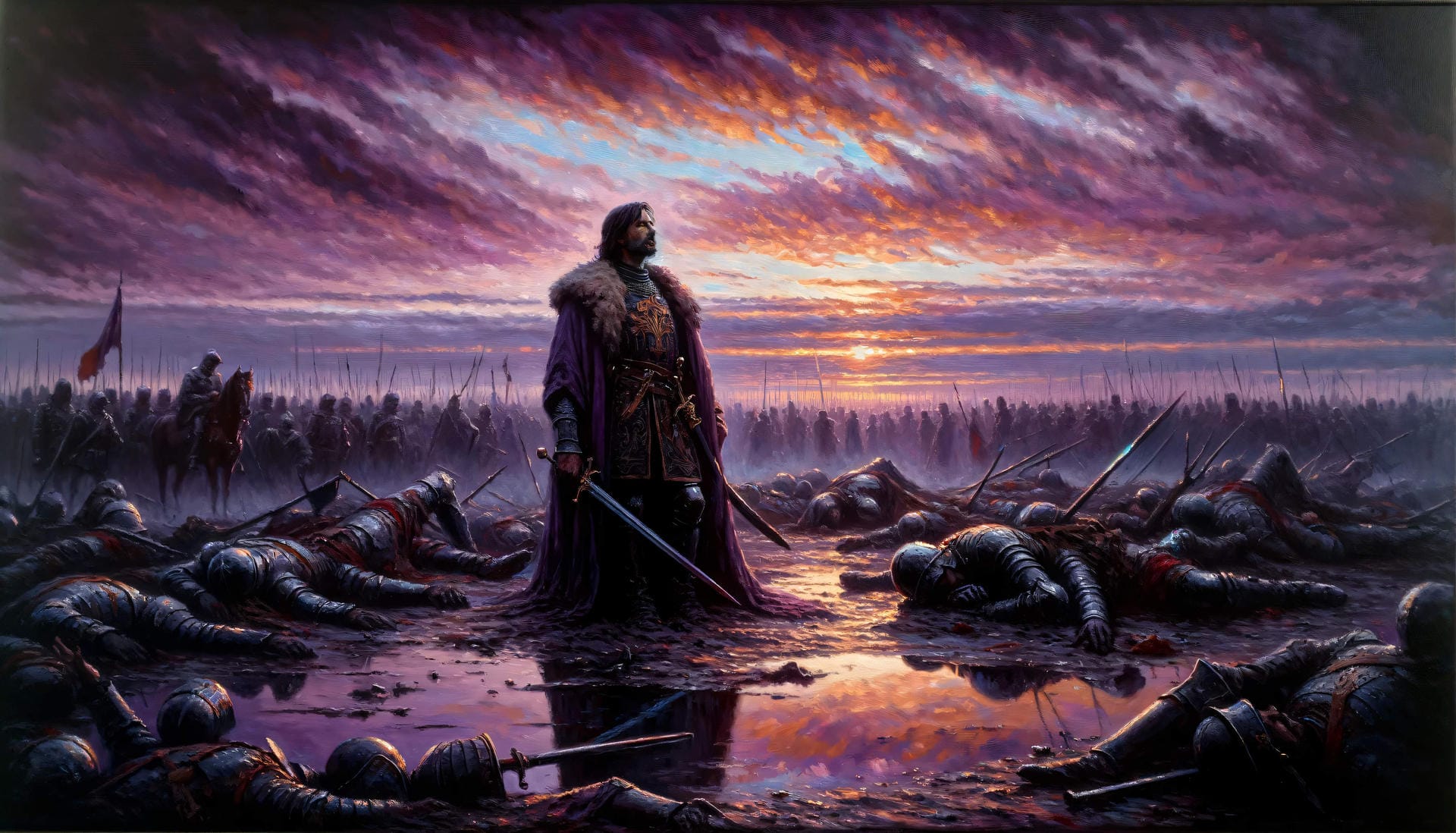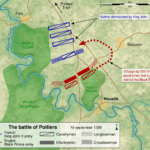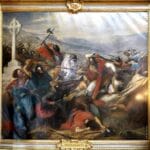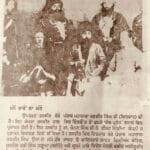Picture this: you’re back in medieval Europe, where a dude named Charles Martel is making a name for himself. He’s got a hammer, and he’s not afraid to use it. This guy was a warrior, a politician, and a history-changer. We’re going to dive into his wild life and legacy, from epic battles to clever moves that shaped the future of Europe. Get ready for a ride through time and history, where the Hammer’s impact still echoes today!
Charles Martel: The Legendary Hammer of Medieval Europe
Picture this: Europe in the early 8th century, a turbulent time of fragmented kingdoms and threats from all corners. Enter Charles Martel, the illegitimate son of a powerful Frankish leader, who rose from the ranks to become one of the most influential figures in European history.
Martel, known as the “Hammer,” was a military genius and a shrewd politician. He inherited his father’s role as mayor of the palace, a position of great power within the Frankish kingdom. But it was his exceptional military leadership that truly set him apart.
In 715, Martel became the undisputed ruler of France, which had been split into three parts. He had a knack for uniting rival factions, bringing order to the chaos and laying the foundation for what would become the mighty Carolingian Empire.
Martel’s most legendary moment came in 732 at the Battle of Poitiers. Facing a massive Muslim army, he outmaneuvered his opponents with brilliant tactics, delivering a crushing blow that halted the Muslim advance into Europe. It was a pivotal victory that saved the continent from being overrun.
After Poitiers, Martel embarked on a series of conquests, expanding the Frankish kingdom into Saxony and Bavaria. His campaigns strengthened the realm and extended its influence across the continent.
But Martel’s legacy extends far beyond his military victories. He was also a keen diplomat, negotiating peace treaties with neighboring powers and establishing a stable foundation for the Frankish state.
Martel died in 741, leaving behind a kingdom that was stronger, more united, and more influential than ever before. His son, Pepin the Short, went on to establish the Carolingian Empire, which shaped the political landscape of Europe for centuries to come.
So, here’s to Charles Martel, the Hammer of Medieval Europe: a man who forged a great kingdom from fragmented parts, who saved the continent from invasion, and who played a pivotal role in the birth of Western civilization.
- The Battle of the Tours is considered one of the pivotal battles in world history.
- The battle of poitiers was a significant battle in the history of France.
- The Battle of Tours was a landmark event in European history.
- The Tours 732 was a decisive battle in the history of Europe.
How did Charles Martel rise to power and establish the Carolingian dynasty?
Imagine a time when everything was falling apart. The kingdom was on fire and threatened from all sides. But then, almost as if from nowhere, a man stepped forward to bring order from chaos and write himself into history: Charles Martel.
The Making of the ‘Hammer’
Charles wasn’t your typical prince charming. He was born out of wedlock and had a tough start in life. But he was determined to prove himself. Through a mix of clever tactics and good old-fashioned grit, he rose through the ranks. He made deals with powerful people and eventually became the ruler of Austrasia, one of the main parts of the Frankish kingdom.
Uniting the Kingdom
Imagine herding cats in a hailstorm—that’s what Charles had to deal with. The kingdom was split, the nobles were fighting, and everyone was just a mess. But Charles didn’t give up. He carefully put the pieces back together, making alliances and smoothing over disagreements. Slowly but surely, the kingdom started coming together.
Saving Europe at ‘The Hammer’
Now, let’s talk about some serious action. The Muslims were spreading their empire, and they had their sights set on Europe. But Charles, with his newly united kingdom, was like the ultimate firewall. In 732, he faced off against a huge Muslim army at a place called Poitiers. And guess what? He totally crushed them! Thanks to Charles, the Muslims were stopped cold. Europe could breathe a sigh of relief.
The Birth of a Dynasty
Charles may not have taken the throne himself, but he paved the way for his family. His son, Pepin, seized power and started what would become the Carolingian Empire. This empire stretched across much of Europe and played a huge role in shaping the history of the continent.
The Man Who Changed Everything
Charles Martel’s story is a reminder that even when things seem their bleakest, there’s always hope. He went from being an underdog to a legendary figure. His rise to power was a combo of brains, bravery, and a whole lot of determination. So, next time you’re feeling like the world is closing in on you, remember Charles Martel and never give up.
What Was Charles Martel’s Military Strategy and How Did It Contribute to His Success?
Charles Martel’s genius on the battlefield earned him the nickname “The Hammer.” His strategies and tactics reshaped medieval warfare and played a crucial role in defending Western Europe from Muslim invasion.
Martel’s Military Reforms
Martel realized the importance of a versatile army. He introduced a mounted force, giving his army increased mobility and speed. He also armed his infantry with better weapons, making them a formidable defensive force.
Innovative Tactics
Instead of engaging in direct confrontations, Martel employed a strategy that used the terrain to his advantage. He would draw his opponents into difficult terrain and wear them down with constant skirmishes. This tactic allowed him to conserve his forces while gradually weakening his enemies.
Uniting the Franks
Martel’s political savvy was as impressive as his military prowess. He united rival Frankish factions under his leadership, creating a cohesive force that could withstand any threat. This unity gave him a strategic advantage over his opponents.
Building Alliances
Martel understood the importance of strategic partnerships. He forged alliances with neighboring tribes and rulers, expanding his influence and securing support. These alliances provided him with vital resources and manpower.
Religious Motivation
Martel’s military campaigns were driven by both religious fervor and political ambition. He was a devout Christian, and his campaigns were often framed as a defense of Christendom against Muslim invasion. This religious motivation inspired his troops and rallied support for his cause.
Martel’s Legacy
Martel’s military prowess propelled him to become one of the most influential figures in medieval Europe. His innovative strategies and decisive victories laid the foundation for the Carolingian Empire and shaped the course of Western civilization. His nickname, “The Hammer,” is a fitting testament to his battlefield brilliance and the profound impact he had on the development of medieval warfare.
Additional Points of Interest:
- Martel’s reforms and tactics were instrumental in the Battle of Poitiers in 732, where he decisively defeated a Muslim army and halted their advance into Western Europe.
- His defensive strategy was particularly effective against mounted opponents, as it prevented them from using their mobility to full advantage.
- Martel’s ability to unite diverse factions under his leadership demonstrated his exceptional political skills.
- His strategic alliances extended his influence beyond Frankish territory and allowed him to maintain a strong position in the region.
- Martel’s legacy continues to be studied and admired by military historians and strategists to this day.
What were Charles Martel’s major accomplishments and how did they shape the Frankish kingdom?
Charles Martel, a guy who made a big impact on the Middle Ages, was like the ultimate fixer-upper for the Frankish kingdom. He was a master at using his brains and his sword to get things done. So, let’s dive into what he did that made him such a legend:
Uniting the Franks
Picture this: the Frankish kingdom was like a bunch of puzzle pieces scattered all over the place. But Martel had this amazing ability to bring people together. He convinced the different parts of the kingdom to play nice and work as one team. This was like putting a giant puzzle back together, and it made the kingdom way stronger and more stable.
Winning Wars
Martel was also a total rockstar in battles. He led the Franks to victory against all kinds of bad guys, including the Frisians, Saxons, and Bavarians. But his most epic win was the Battle of Tours/Poitiers in 732. He totally crushed a huge Muslim army, stopping them from taking over Europe. This battle gave him the nickname “Martel,” which means “the Hammer.” That’s like the ultimate warrior trophy!
Making the Kingdom Stronghold
Martel was more than just a great general. He also made the Frankish army super strong. He brought in new weapons and tactics, and he built a bunch of fortresses around the kingdom. These moves made it really tough for enemies to attack.
Planting the Seeds of Something Big
Martel wasn’t just into beating people up. He also supported people who spread the word about Christianity and made sure there were plenty of places to learn. This helped set the stage for the Carolingian Renaissance, which was like a golden age of art, science, and culture.
Summary:
- Martel united the Frankish kingdom, making it one big, happy family.
- He kicked butt in battles, including the Battle of Tours/Poitiers, which stopped a Muslim invasion.
- Martel made the Frankish army unstoppable and built strongholds to keep the kingdom safe.
- His support for education and Christianity laid the foundation for an intellectual revolution.
FAQ
Q1: What was Charles Martel’s role in the Battle of Poitiers?
A1: Charles Martel played a pivotal role in the Battle of Poitiers in 732, where he led the Frankish army to a decisive victory against the invading Muslim forces. This victory is widely credited with halting the Muslim advance into Europe and preserving Christian civilization.
Q2: Why is Charles Martel known as “The Hammer”?
A2: Charles Martel earned the nickname “The Hammer” due to his military prowess and aggressive campaigns against his enemies. He was known for his brutal tactics and his unwavering determination, which made him a formidable opponent on the battlefield.
Q3: How did Charles Martel consolidate his power?
A3: Charles Martel consolidated his power through a combination of military victories and political alliances. He effectively ruled the entire Frankish realm despite not holding the formal title of king. By subduing rival factions and establishing alliances with key figures, he was able to establish a stable and centralized authority.
Q4: What were some of Charles Martel’s key military reforms?
A4: Charles Martel introduced several significant military reforms that enhanced the effectiveness of the Frankish army. He strengthened the cavalry, introduced new tactics, and implemented a system of conscription. These reforms laid the foundation for the military dominance of the Franks in the centuries that followed.
Q5: What was the significance of Charles Martel’s reign?
A5: Charles Martel’s reign was a pivotal period in European history. His military victories, particularly at Poitiers, played a decisive role in shaping the course of medieval Europe. He laid the groundwork for the Carolingian Renaissance and the emergence of the powerful Frankish empire, which became a major force in Western civilization.
















